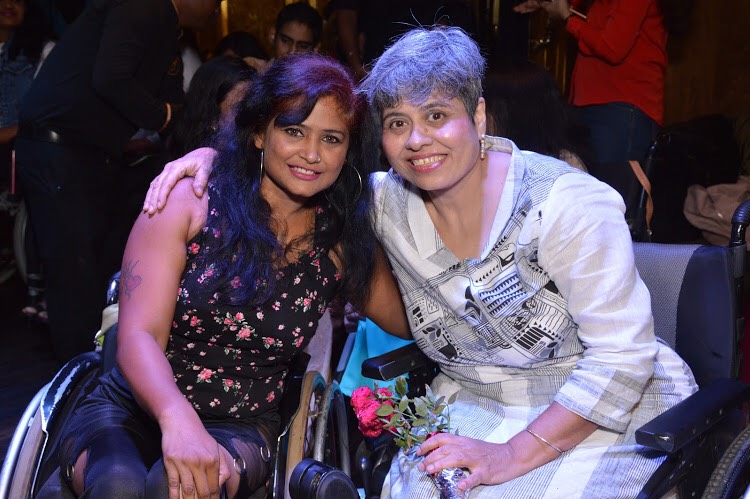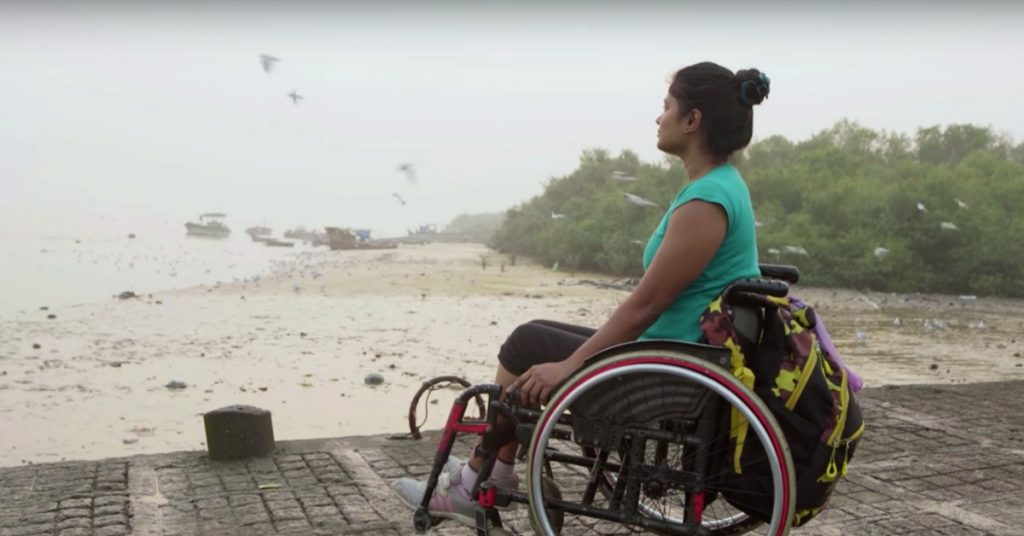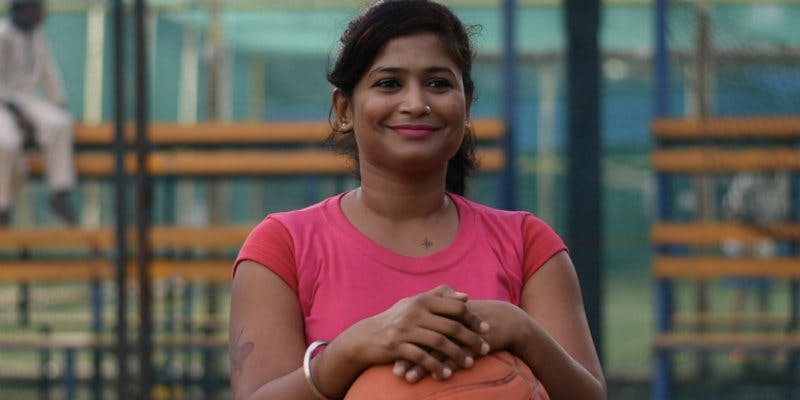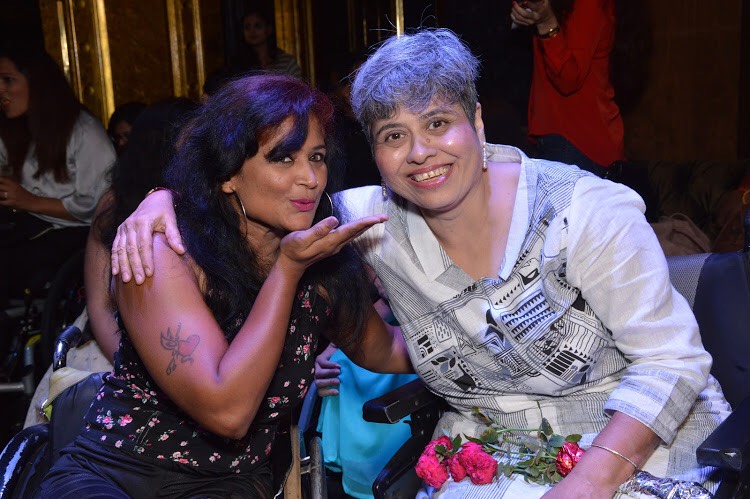This article written by Ayushi Shah was first published in ‘White Print’ – a braille magazine for the visually impaired, founded and published by Upasana Makati.
Our circumstances make us who we are. Every difficult situation leaves us a little more polished for the longer journey ahead. And although grueling, we’re compelled to make a choice – to succumb or to succeed. Nisha Gupta, a national level swimmer and an international level basketball player, chose the latter.
The Unfortunate Incident That Changed The Course
At the age of 18, Nisha had gone to her hometown Varanasi for a holiday with her parents. Playful as ever, she climbed a tree to pluck some mangoes. In a span of a few minutes, her leg slipped and she fell down – sustaining heavy head and spiral cord injuries. The only thing she remembers is waking up in a hospital in Mumbai two days later. Her parents were told that she might never be able to sit again – let alone walk. Unaware of these developments, Nisha was still under the impression that there was hope for her to recover.
After her discharge, she began her rehabilitation at the All India Institute Rehabilitation Centre in Haji Ali. There, with the help of physiotherapy, she was taught how to sit and stand with calipers. Despite the three month therapy, her legs did not show any improvement. When she finally confronted her doctor about her injury, he told her that it was permanent and she would never be able to walk again. Devastated, Nisha seeped into depression – refusing to get out of her house for the next four years. Her days would begin and end on her bed sleeping and watching TV.

The Realization Of Being Small Part Of A Big Whole
One day, her doctor referred her to Nina Foundation, an organization that works towards spreading optimism and hope of good health to people with spinal cord injuries. She reluctantly went for one of their sessions with her brother. But when she entered the premises, she was surprised to see other paraplegics and quadriplegics on wheelchairs. It was the first time that she realized that she wasn’t alone in this. By the end of the session, thanks to Dr Ketna Mehta, founder of Nina Foundation and Sunita Sancheti, a member – she was pumped up to look at things differently.
Determined to take up opportunities, she started working as a data entry personnel from home. However, her then dream was to become a tattoo artist. Her childhood friend Kavita heard of this and soon introduced her to a professional who trained her for the next three months. The realisation that she could follow her passion was addictive. One thing led to another and before she knew it – she was juggling between a host of things.
From Stagnancy To Inspired Action
Nisha participated in the Mumbai marathon, and learnt wheelchair dancing, para swimming and para badminton. She even participated in the Miss Wheelchair India contest in 2013. The sky was the limit for Nisha, and this was only the beginning. In 2014, to support para-athletes, she attended a para swimming competition in Dharavi. The joy of watching them fueled her spirit and she was instantly captivated by the sport. This was her first moment with sports. Little did she know that in few years, it would become her life!
With the help of her friend Oliver D’souza, she learnt how to swim. Today, her achievements include three state-level gold medals and three national-level bronze medals in the sport. She could travel for competitions, thanks to the support by Nina Foundation. At the same time, she was also practising basketball and soon started taking part in competitions.
In 2015, her team won the bronze medal in the National Wheelchair Basketball championship held in Delhi. In 2017, she was part of the Indian Wheelchair Basketball team that won the bronze at an international competition in Bali, Indonesia. She currently plays for the Maharashtra Women’s Wheelchair Basketball team.

Excerpts from our conversation with the rising star –
Seeking Provision For Dignity In Independence
Nisha says, “My friend Oliver asked me to learn swimming because it’s great exercise for us. Luckily Mumbai has a sports center in Dharavi which is wheelchair friendly, so I could go there to learn and practice. And, the fact that the premises were accessible made a huge difference. It’s not a one day stint where you can ask someone to lift you and assist you. Sports requires a long term commitment so you have to figure your own independent way out. After all, if you’re dependent on someone every single day – it’s going to cause a lot of frustration to you as well. So, to be independent is the most essential of all.”
She shares that although Mumbai is a great city, it is definitely not disability friendly. “Something as basic as public washrooms aren’t accessible to all. If every railway station has general washrooms – can they really not make even the most basic arrangements for us? On the other hand, even though I travel by local trains all the time – by the time I get into the handicap compartment – it is already full of the general public! The least the government can do is install CCTV cameras so that the compartment can be used by those whom it’s allotted to. Buses aren’t accessible either.”
“Public places that actually have ramps are malls. Then again, they are installed primarily for shopping carts and trolley. Their priority isn’t accessibility. Most theatres aren’t wheelchair friendly either. We have to really hunt down places that have facilities for us. I hope at least the metro they are constructing now is accessible with handicap friendly washrooms and volunteers to help us wherever needed.”
“The people of this city are wonderful and always willing to help out. Whether it is getting my wheelchair down station stairs or getting out of the taxi – for every person who says a no, there are ten who come to help. However, even when there are four people to help me get my wheelchair down the stairs – my fingers are constantly crossed. Even if one of their hands or feet slip by mistake, there is a lot at stake.”

A Much-Needed Uplift Through Sports
Nisha goes to the gym every morning for two hours after which she freshens up. Post that, she makes lunch and practises basketball. She spends an hour on the wheelchair in the evenings. Apart from that, she has basketball practice on weekends at the Kalina University court in Santacruz.
She shares, “Luckily, we’ve shifted from YMCA, Borivali to an indoor court at Kalina. As most of the other slots would be booked at YMCA, we had to make-do with the afternoon slots around 2 pm. It used to be scorching hot. With the support of Kalina, we can now practice in the rains as well.”
“Sports are my life. Exercising is very important for us, but we do not have a lot of workout options. That’s where sports fills the void. But more than anything else, it leaves you with a positive attitude and lots of confidence. For example, today I travel alone in the local train only because of sports. This helps because the more we’re out in the public eye – the more the public realizes that we are not different. There are so many of us facing the same problems every day. Maybe if they see us all around, they will take note of our struggles and help us fight for inclusion.”
Challenges Faced By Para Athletes
Nisha opines that the government can definitely do a lot more than what it’s doing now. She says,
“First and foremost, it should support athletes with disabilities financially. States like Haryana and Rajasthan felicitate their para-athletes with five lakh if they win a gold. Can the Maharashtra government not compensate us in any way? All our sports related expenses come from our own pockets. The only pension we get is Rs 600 per month, and not because we’re athletes but because we are disabled. That amount is just not enough. When the government supports us with sports, it not only is great for our health but it also helps more and more of us to realize our potential.”
“Supporting myself financially has been the most difficult. If you’re playing for your country and still paying out of your pocket – then after a point even your family starts questioning the point of it all. It becomes hard to explain then. More than anything else, if I am empowered, I can help empower others as well.”
Nisha further states that the fact that the girl who was skeptical about getting out of her house is now travelling alone internationally is something she considers to be an achievement. She continues, “In fact, I’ve travelled to Indore, Delhi, Hyderabad, Chennai and Thailand for competitions. Apart from that, the time we represented India and won the bronze medal in Bali – never in my dreams had I thought I would represent India. The label “international player” stays with you forever. Another achievement I cherish the most is that my niece who is five always says that she wants to be like me because I bring home medals from wherever I go. She’s my smallest and my biggest fan!”

Significance Of Having Strong Role Models & Family Support
Every few months, Nisha goes back to her rehabilitation center and talks to the patients there. She says that it’s very important for them to see someone they can relate to. She shares, “My own role models include my dad and my friend Oliver D’souza. Sometimes, personal journeys are a quest of their own and they taught me how to get out of my house and become independent.”
“The biggest setback for anyone with a spiral cord injury is the lack of acceptance. It is very hard to accept the permanency of the situation. They confine themselves to their houses and stop working. When you lose your spine, your family is your backbone. In times like these – they can support by showing them that nothing has changed. Keep them away from negativity. Sometimes, telling them that you’re there for them means everything! Perhaps if India was more accessible, things would’ve been different. But for now, this is it.”
When asked where she sees herself in the next five years, Nisha Gupta smiles, “I see myself marching towards being an independent individual and also help people like me to achieve their dreams!”
Liked reading this? Then you might also like to read Girls At Dhabas – Reclaiming Women’s Right To Access Public Spaces In Pakistan.
If there’s any story that needs to be told, we will tell it. Write to us at contact@knowyourstar.com with your story lead, or contact us on Facebook or Twitter.